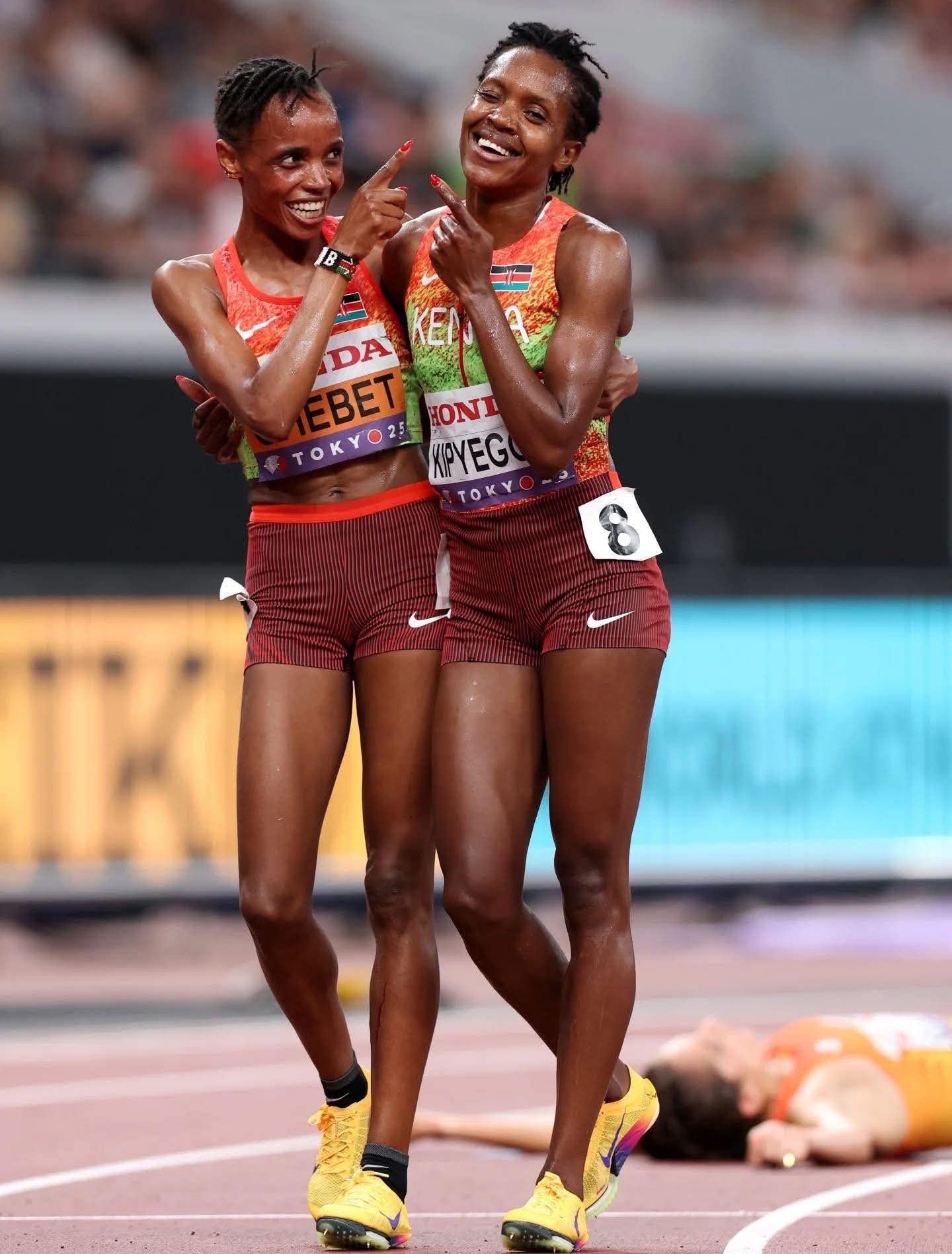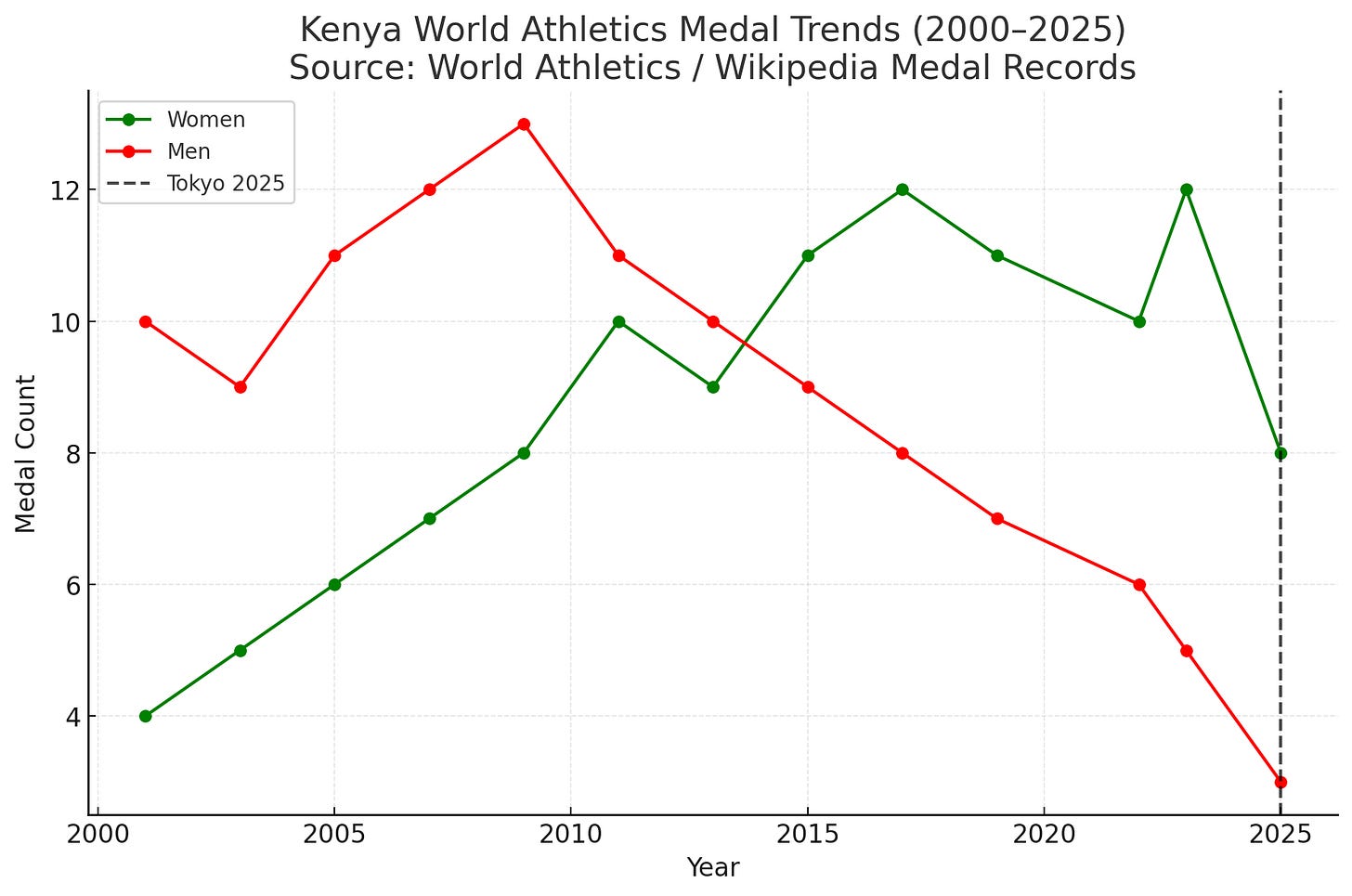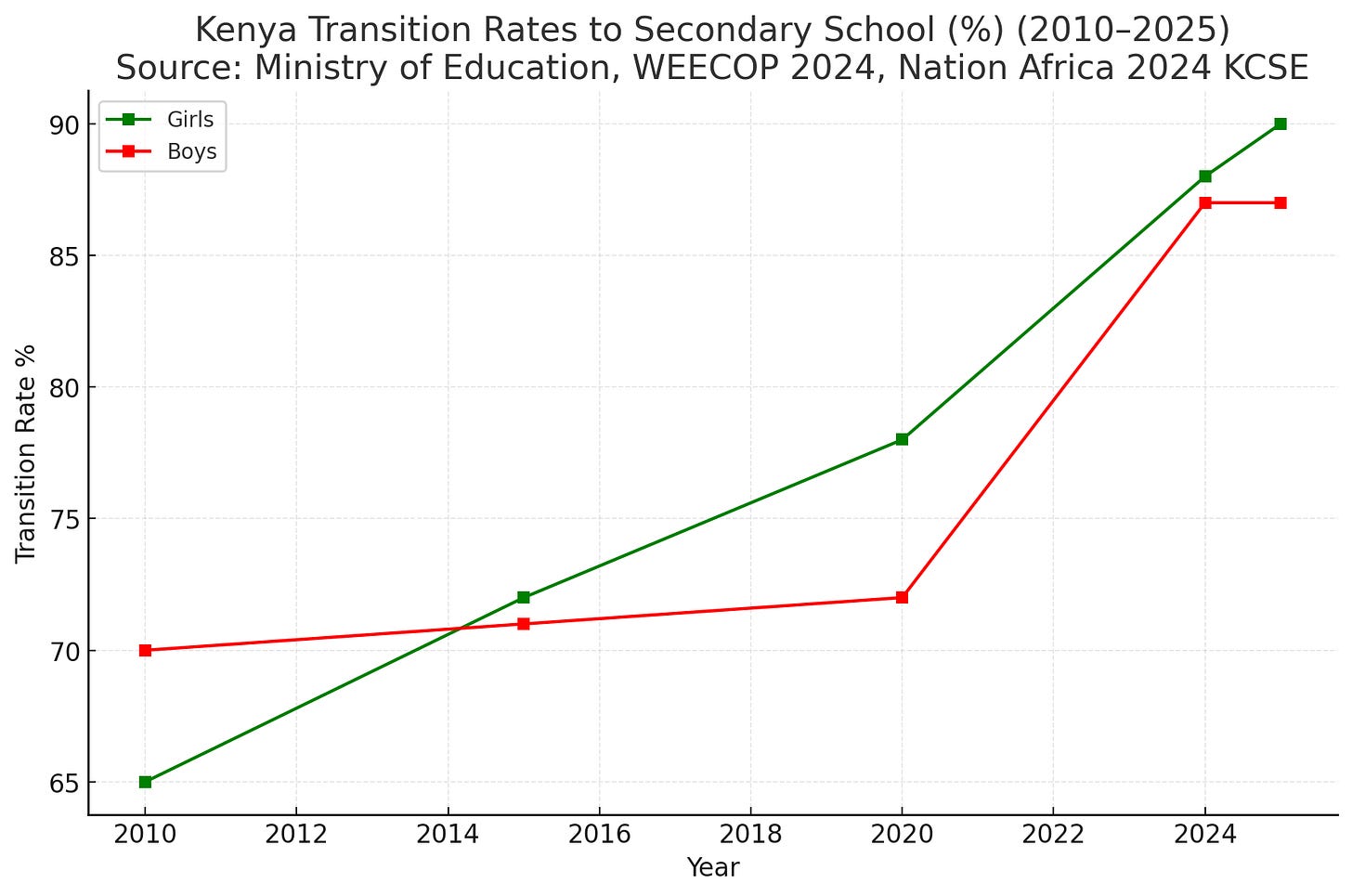While the Men Drew the Fire, the Women Won the Gold
Behind every woman’s success is a deliberately quiet man. #SameForest #DifferentMonkeys
Beatrice Chebet and Faith Kipyegon celebrate their Tokyo 2025 medals. (Photo: Joris Verwijst / BSR Agency / Getty Images)
THE NO LOOK PASS
Every team has its no-look pass. In rugby we call it “Back In” — when the defenders swarm the obvious target, the ball is slipped behind their backs to the forgotten runner, who storms through untouched.
That’s exactly what happened in Tokyo 2025 (and for the last 10 years).
The competitors, the cameras, the commentators, the pressure — all fixed on the Kenyan men. Emmanuel Wanyonyi, Kipchoge’s heirs, Rudisha’s shadow.
But when the men stumbled, the women stormed through the gap.
Beatrice Chebet struck twice (10,000m and 5,000m). Faith Kipyegon took 1500m gold and 5000m silver. Peres Jepchirchir ruled the marathon. Faith Cherotich, the last-born of the group, bagged the 3000m steeplechase gold.
And then came the shock of shocks — Lillian Odira, little known outside athletics circles, ripped up the script by smashing the 800m world record to claim gold. Kenya’s medal tally shot to 7 golds, sealing female dominance in Tokyo.
The men’s two bronzes felt like curtain-raisers. Wanyonyi’s 800m gold was the reminder:
Sisi bado tuko
📊 Kenya Medal Trends (2000–2025)
🥇 Sports as Society in Spikes
For decades, men were the benchmark. Every record, every headline, every expectation was measured against them.
That’s how society has always treated the boy child too.
In African culture, he was the yardstick — the provider, the warrior, the backbone for parents, siblings, cousins, nieces, nephews.
All eyes on him. (the Bible & Tupac say so too)
The women? They were supported, yes — but never with the same expectations.
Coming in second was survivable. “After all, men have always dominated.”
That gap — less pressure, more empowerment — became freedom. And women used it well. On the track, in classrooms, in boardrooms, they surged ahead while the men carried the weight of tradition.
📚 Education Echo: Girls Pull Ahead
The classroom reflects the track.
Girls now outperform boys in literacy, transition rates, and university enrollment. By 2024, for the first time in Kenya’s history, more girls (482,202) than boys (480,310) sat KCSE.
📊 Transition Rates to Secondary School (Girls vs Boys, 2010–2025)
The boy child? Plateauing. Struggling with identity. Drifting into betting, alcohol, crime.
While society pours resources into the girl child, the boys are left jogging in the same spot.
💼 Business Layer: Who Really Runs the Budgets?
On paper, the formal numbers tell one story. Women hold 19% of board seats (FSD Kenya 2024). They access 50% of SME funding through facilities like the EIB/KCB credit line (2023).
📊 Business Representation (2025)
But the real story is on the ground — the Kadogo economy.
Chamas and merry-go-rounds moving billions informally.
Mama mbogas financing households one Sukuma wiki at a time.
Market traders, mitumba sellers, kiosks, salons, kinyozis.
Here, women dominate. They run the networks, the numbers, the daily cashflow. This is the true economy of survival.
And its spine is female.
The men? Many are in boda-boda groups, construction, Arsenal & ManU die-hards, casual hustles — precarious, less networked, more vulnerable.
So, while the headlines speak of “19% board seats,” the unspoken truth is…..
Kenya’s economic heartbeat is already in women’s hands.
💡 Sales & Business No-Look Passes
Just as the women stole the spotlight in Tokyo, businesses too have mastered the no-look pass.
Insurance: For years, Kenya’s sales stars were the life and education policy agents, promising care for one’s family. But when trust in those products waned, insurers slipped the ball behind their backs. Money market funds, unit trusts, and investments became the new heroes. Same promise — security for yourself & family(ish) — just packaged funkier & more self-ingratiating ( a mirror of our values perhaps?).
Mobile Apps: The giants realised not every user had a 128GB phone (mimi ni member). So they threw a no-look pass with lite versions. Facebook Lite, YouTube Go — same product, smaller size. Suddenly, Africa & millions of low-memory phones were back in the game.
Java & Artcaffé: I suspect their kitchen ovens had a lot of idle capacity, revving engines forced to shut down in the afternoons. Instead of chasing new menus, they pivoted to Cookies — the no-look pass that turned downtime into a revenue stream.
The Brandy & Wine Story: Every time a brandy drinker sneers at wine, remind them that brandy is distilled from wine — the residue, the leftover (brandy actually means “burnt wine in Dutch”) Tuliza Cottage apologies hehe. It was the wine makers’ no-look pass. One (wo)man’s by-product became another man’s drink of choice.
Gjenge Makers: When plastic waste piled up in Nairobi, Nzambi Matee turned it into bricks and paving blocks. A no-look pass in construction — transforming trash into infrastructure. A woman leading a quiet revolution, turning what society discarded into something strong enough to build on.
The same principle applies everywhere: the unexpected play wins the day.
🎭 The Boy Child Revelation
Here’s the uncomfortable question:
In chasing equity, have we tilted the scale so far that equality is no longer the goal?
Was sacrificing the boy child at the altar of girl-child empowerment the bargain society was willing to make?
And what happens now, when the same men are dismissed as “soft” by the very voices that once branded them “chauvinist”?
Empowerment worked. The women are winning. But the boy child’s dignity, character, and role have withered.
Was this deliberate, unintended — or Collateral Damage?
🧑🏾🏫 The Mentor in the Shadows
There’s another twist we rarely acknowledge.
Faith Cherotich and many of the young athletes speak openly about their coaches. In boardrooms too, most successful women will quietly admit they had male mentors who opened doors for them.
Do the math: if only 19% of board seats are held by women, chances are 80% of their sponsors and mentors are men. Men nurtured them, trained them, vouched for them. Yet these mentors hide in the shadows lest the uncomfortable question gets asked:
👉 What have you done for the boy child lately?
🔥 Closing Kick
“Tokyo 2025 was not just sport. It was society running in spikes. Kenya’s women didn’t just win medals — Chebet, Kipyegon, Cherotich, Jepchirchir, Odira — they rewrote the script.”
The men? They took two bronzes and one glorious gold. Enough to remind the world:
Sisi bado tuko.
Because every no-look pass only works if the ball carrier is still in the game 😉
👥 And hey — we hit 200 subscribers on Friday. Shukran fam…. Jah Bless🙏🏾.
Keep subscribing, sharing, and calling us for a chat and chai.
As my buddies who went to NYS say……AJWAP!!




